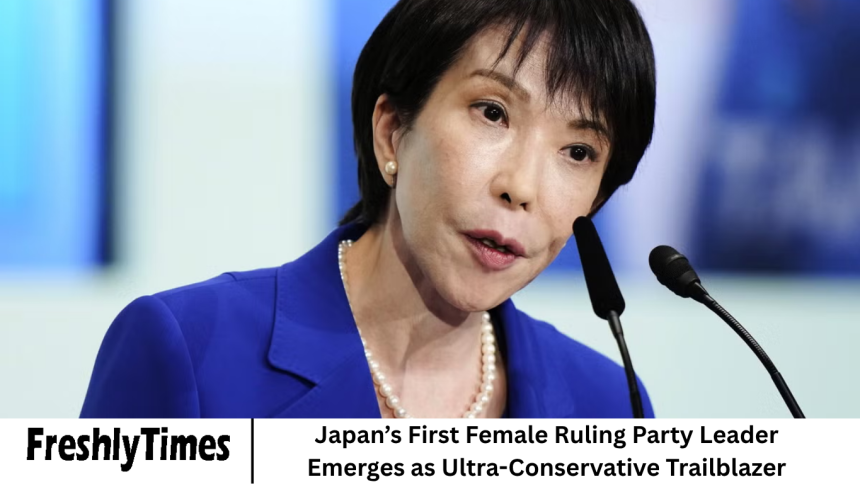Japan has made political history by electing its first female leader of a ruling party—an ultra-conservative politician whose rise signals both progress and controversy. The election marks a defining moment in Japan’s political evolution.
- A Landmark Moment in Japanese Politics
- Who Is Japan’s New Ultra-Conservative Leader?
- Breaking Barriers in a Male-Dominated Party
- An Ideological Profile: Tradition Meets Nationalism
- Reactions: Admiration, Anxiety, and Debate
- Gender Paradox: A Feminist Icon or a Conservative Symbol?
- The Challenges Ahead
- Economic Stagnation
- Security and Defense
- Demographics and Social Welfare
- International Diplomacy
- Internal Party Politics
- Public Opinion and Media Coverage
- Frequently Asked Question
Blending a long-overdue milestone for gender representation with renewed debates about the nation’s conservative identity and future direction. The new leader, a seasoned lawmaker known for her hardline stances on national security, traditional family values, and constitutional revision.
Now finds herself at the center of both admiration and scrutiny. Her ascent within a male-dominated political culture not only challenges Japan’s entrenched gender norms but also raises crucial questions about the ideological trajectory of the country’s dominant political force.
More Read: UK Police Probe Suspected Arson at England Mosque as Possible Hate Crime
A Landmark Moment in Japanese Politics
For decades, Japan has been known for its striking gender imbalance in politics. Women make up less than 10% of the lower house of parliament, and only a handful have ever held senior cabinet positions.
The election of the first woman to lead the ruling party—effectively putting her in line to become prime minister—marks a symbolic breakthrough in a political culture where men have traditionally dominated power structures.
While several women have previously made bids for leadership, none managed to break through the rigid ranks of Japan’s conservative establishment. Her victory reflects a changing mood within some corners of the ruling Liberal Democratic Party (LDP) and a broader public desire for new perspectives in leadership.
Yet it also underscores the paradox of progress: a female leader whose ideology aligns with some of the country’s most conservative traditions.
Who Is Japan’s New Ultra-Conservative Leader?
The new leader’s rise to prominence was not sudden. She has long been recognized as one of the most charismatic, outspoken figures in Japanese politics. A lawmaker with decades of experience, she has served in various cabinet roles, including defense and foreign affairs.
Earning a reputation for her staunch views on national security and her unwavering belief in Japan’s self-reliance. Her political roots trace back to a deeply traditionalist faction within the LDP. She advocates for policies that promote patriotism, strengthen Japan’s military posture.
And restore what she calls “moral order” in Japanese society. Her ideology is shaped by a conviction that Japan must reclaim its national pride—an idea often associated with revisionist views of the country’s wartime history.
Born into a middle-class family, she entered politics after a successful career in media and public advocacy. Her articulate communication style and command of public narratives helped her connect with conservative voters.
While her gender allowed her to project a modern image in contrast to older male counterparts. This duality—modern image, traditional values—has become her defining political brand.
Breaking Barriers in a Male-Dominated Party
The Liberal Democratic Party, Japan’s dominant political force since the 1950s, is infamous for its old boys’ network. Internal power structures have historically favored senior male politicians, and women’s representation within the party has remained minimal.
Her victory required navigating this intricate web of factional politics, where loyalty, hierarchy, and personal networks often outweigh policy differences. She skillfully built alliances across ideological lines, winning the support of influential party elders while energizing grassroots members frustrated by stagnation in leadership.
Her ascent is not just a personal achievement—it is also a case study in political survival. In a culture that often sidelines women in leadership, she has demonstrated an exceptional ability to command respect from male peers, leveraging both her conservative credentials and her public appeal.
This balancing act—appeasing traditionalists while embodying reform—was crucial to her victory.
An Ideological Profile: Tradition Meets Nationalism
What makes her leadership particularly notable is the combination of gender symbolism and ideological conservatism. Unlike progressive female politicians in other nations who champion feminist or liberal causes, Japan’s new leader represents the opposite end of the spectrum.
Constitutional Revision
She is a leading proponent of revising Japan’s postwar constitution, particularly Article 9—the clause that renounces war and prohibits maintaining a standing military. She argues that Japan must have a “normal defense posture” in light of regional threats from China and North Korea.
Her stance has resonated with nationalist voters but alarmed pacifist groups and neighboring nations that fear a revival of militarism.
Family and Gender Roles
Her vision for Japan’s future includes reinforcing what she calls “traditional family values.” She has opposed legislation supporting same-sex marriage and gender quotas in parliament, arguing that such measures “undermine Japan’s cultural fabric.”
Critics see this as hypocrisy—a woman breaking barriers while promoting conservative gender norms.
Education Reform
She supports patriotic education and revisions to history textbooks that present Japan’s wartime actions in a more positive light. Her critics accuse her of whitewashing history, while supporters see her as defending national pride from what they view as unfair foreign narratives.
Economic Policy
While she lacks a strong economic portfolio, she has emphasized self-sufficiency, support for small businesses, and reduced dependence on foreign labor. Economists warn, however, that such policies could hinder innovation and deepen Japan’s labor shortages.
Foreign Relations
Her approach to diplomacy aligns with her nationalistic stance—closer ties with the United States on defense, a hard line against China and North Korea, and cautious engagement with South Korea. She also supports Taiwan’s inclusion in international organizations, a position likely to anger Beijing.
Reactions: Admiration, Anxiety, and Debate
The election result has triggered mixed reactions both domestically and internationally.
Domestic Response
Among conservatives, her win is celebrated as a “return to patriotic leadership.” Supporters hail her as a strong, decisive leader who will stand up to foreign pressure and defend Japan’s interests.
Women across Japan have also expressed pride in seeing one of their own rise to the nation’s highest political ranks—even if they don’t share her ideology. However, progressive groups and feminist organizations are more skeptical.
Many argue that her leadership does not represent a real breakthrough for gender equality, as her policies could reinforce patriarchal norms rather than dismantle them. Political analysts also warn that her hardline stance may alienate centrist voters, particularly younger generations seeking a more inclusive society.
International Reactions
Global observers are watching closely. Western allies see her as a dependable but unpredictable partner—committed to defense cooperation yet potentially disruptive on historical and social issues.
China and South Korea, meanwhile, have expressed concern about her nationalist agenda, fearing renewed tensions over territorial disputes and historical memory.
The media in neighboring countries have described her rise as “symbolic but unsettling,” reflecting the delicate balance Japan must strike between asserting national identity and maintaining regional diplomacy.
Gender Paradox: A Feminist Icon or a Conservative Symbol?
One of the most fascinating aspects of her leadership is the contradiction between her gender and her ideology. She is a symbol of female empowerment simply by virtue of her position, yet her policies often clash with feminist ideals.
Supporters argue that her rise proves women can succeed in Japan’s toughest political environment without relying on quotas or affirmative action. They view her as proof that meritocracy, not gender-based reform, can bring change.
Critics, however, counter that she reinforces the very structures that exclude most women from power. Her success, they argue, is an exception that validates the status quo rather than challenging it. By rejecting gender equality measures, she risks slowing broader progress for women in Japanese society.
This dual identity—female pioneer and conservative stalwart—makes her one of the most complex figures in modern Japanese politics.
The Challenges Ahead
Taking the helm of Japan’s ruling party comes with monumental challenges. The country faces a sluggish economy, a rapidly aging population, and rising geopolitical tensions in East Asia. Managing these crises will test not only her political acumen but also her ability to bridge divides within her party and across the nation.
Economic Stagnation
Japan continues to grapple with deflationary pressures, stagnant wages, and labor shortages. Implementing structural reforms without alienating the working class or business elites will be a delicate balancing act.
Security and Defense
Her push to expand Japan’s military role will likely dominate her early tenure. Securing public support for constitutional reform requires a national referendum—a difficult feat in a country where pacifism remains deeply rooted.
Demographics and Social Welfare
Japan’s population is aging faster than any other major economy. She must address declining birth rates and rising healthcare costs while reconciling her conservative family policies with the realities of modern society.
International Diplomacy
Managing Japan’s complex relationships with China, South Korea, and the United States will demand diplomatic finesse. Her nationalist rhetoric may strain ties, but her credibility on defense could strengthen alliances.
Internal Party Politics
Even as leader, she faces opposition within her own ranks. Many LDP members view her as too divisive or ideologically rigid. Maintaining unity will be essential to governing effectively.
Public Opinion and Media Coverage
Public reaction remains divided. Early polls suggest that while many admire her determination and charisma, skepticism lingers over her ability to represent a diverse, modern Japan. Younger voters, particularly women, are cautious, expressing hope for change but concern over her conservative agenda.
Media outlets have framed her as a “trailblazer with a hard edge,” highlighting both her achievement and her contradictions. International coverage tends to emphasize the novelty of her gender combined with the ideological conservatism that defines her politics.
Social media, meanwhile, is abuzz with debate—some hailing her as a “female Thatcher,” others warning that she could drag Japan backward on gender equality and historical reconciliation.
Frequently Asked Question
Who is Japan’s first female ruling party leader?
She is a veteran politician from the Liberal Democratic Party known for her ultra-conservative views on national security, family values, and constitutional reform. Her career spans decades in public service, including key cabinet roles.
Why is her election historically significant?
She is the first woman ever to lead Japan’s ruling party, breaking a long-standing gender barrier in one of the world’s most male-dominated political systems. Her victory symbolizes both gender progress and political conservatism.
What are her main political priorities?
Her agenda includes revising Japan’s pacifist constitution, strengthening the military, promoting traditional family values, and fostering economic self-reliance. She also supports patriotic education reforms.
How do her policies affect women’s rights and gender equality?
While her leadership is groundbreaking for women in politics, her opposition to gender quotas, same-sex marriage, and feminist reforms has drawn criticism from equality advocates.
How have neighboring countries reacted to her leadership?
China and South Korea have expressed concern over her nationalist and revisionist tendencies, fearing renewed tensions over wartime history and territorial disputes.
What challenges does she face as Japan’s leader?
She must tackle economic stagnation, demographic decline, security threats, and internal party divisions—all while managing public skepticism about her ideology.
Does her leadership signal a shift in Japan’s future direction?
Yes. Her rise could mark a turn toward stronger nationalism, assertive defense policies, and a reassertion of traditional values—reshaping Japan’s political landscape for years to come.
Conclusion
The election of Japan’s first female ruling party leader is a landmark in the nation’s political history. It represents both a step forward for representation and a reaffirmation of conservative power.
Her leadership embodies the complexities of modern Japan—a society caught between progress and tradition, globalization and nationalism, equality and hierarchy. Her rise will likely redefine Japan’s domestic politics and its place in the world.













